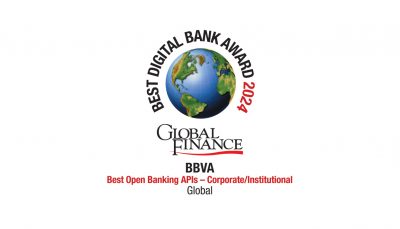Our society is becoming an ever more digital environment in which we are all interconnected. This is proved by the data: over three million searches are made every minute in Google; we send almost 2.5 million e-mails every second; 6,000 tweets are sent on Twitter in the same time; and 80 million photos a day are posted on Instagram. Throughout 2016 it is expected that more than 330,000 million electronic transactions will be made.
In view of these figures, in her talk at one of the OpenExpo conferences, Carmen Cuesta, CTO of Nimble Payments at BBVA noted that business processes are now much more open and collaborative. And the major digital service providers have played a key role in this transformation by changing the traditional models and:
1. Industrializing their processes for generating products
2. Encouraging third parties to develop on their services
These changes are largely possible thanks to the boom in APIs. Cuesta classified the APIs into three types:
1. Private: They enable the internal integration of apps and systems. This type of programming interface increases efficiency, reduces costs, improves internal operations and generates greater agility.
2. Collaborative: They allow communication and integration between partners. These types of APIs are the ones that generate most added value.
3. Public: They enable information and functionalities to be displayed to third parties. This type of APIs is extending the market and producing new sources of income as they can be considered a product in themselves.
The technical manager of Nimble Payments at BBVA pointed out that this is the reason that when she asks her team to develop a service, even one intended for internal consumption, “They need to develop with third parties in mind, as though they were going to be public APIs. That way it’s easier to reuse these elements and gain efficiency and agility”.
The arrival of APIs in the world of banking
This revolution triggered by APIs has now arrived in the banking sector. “Our customers are becoming more used to having digital services and being able to compare them, so they expect to find the same immediacy they’ve become accustomed to”. Otherwise, said Cuesta, “they’re going to ask themselves how it’s possible to have a conference in real-time with Singapore or stream a video, but for it to take five days to make a transfer to the US. It doesn’t make sense”.
Cuesta also acknowledged that fintech startups “are emerging and starting to operate in all the banks’ value chains –payments, loans, finance management, planning, wealth management and so on. There’s practically no service that doesn’t have a startup nearby”.
This is why she emphasized that “banks have to react and not only copy. She believes “they need to position themselves better and gain agility, and that can be done with APIs. We need to understand how the major technology companies have done this, and open up to third parties so our services gain in value”.
On this point, before a packed audience of free software professionals, she said that “suddenly exposing our services to third parties represents a major shift in our way of thinking” in the banking sector, and added that at BBVA they’re convinced that “it has its advantages”.

PSD2, the new rules of the game
The EU’s new payment services directive (PSD2) will lay down the new rules of the game for this process of opening up the banking sector. Among other points, Carmen Cuesta noted that it requires banks to “allow third parties to access their customers’ accounts and to initiate payments in their name, always with the prior authorization of the interested party”.
In her opinion, with this regulation, the EU seeks to “encourage innovation and competition” in order to benefit the consumer with “new payment services that are more closely tailored to their needs, but in a secure environment”. Although the directive was approved in 2015, until September 2018 the technical standards to be defined by the European Bank Authority (EBA) will not come into force.
The PSD2 has the following goals:
-
To establish a level playing field for service payment providers.
-
To encourage innovation and competition as a means of ensuring more affordable costs for the end consumer.
-
To ensure security in payments and a high level of consumer protection.
-
To encourage the development of common standards and interoperability.
Open platform on BBVA
In response to this transformation taking place in the financial ecosystem, Carmen Cuesta highlighted the change in direction in BBVA’s strategy: “We believe opening our doors and allowing third parties to develop on our architecture offers more opportunities than drawbacks”.
She noted the launch in the beta phase of the open platform portal BBVA API Market which offers financial APIs that are open to third parties. “The challenge is to enable consumers to attract banking services to their environment and consume them wherever they want”.
Among the examples of financial APIs, Cuesta mentioned the following types:
1. Identification and authentication services: These allow the authentication of the user and access to their information, such as BBVA Identity or Capital One.
2. Access to information and movements in an account: This API provides information on an account’s balance and movements. Examples are Crédit Agricole, Banc Sabadell and BBVA Accounts.
3. Aggregate information on card movements: This enables geomarketing and business intelligence actions and market studies, among others. One example is BBVA PayStats.
4. Initiate transfers: This leads to the creation of new business models by initiating payments, such as BBVA Money Transfers.
5. eCommerce: This makes it possible to manage payments, improve the user experience, make returns with a payment gateway… Examples are: BBVA’s Nimble Payments, PayPal and Stripe.

If you want to know more about BBVA’s financial APIs, visit this website.
If you want to try BBVA’s APIs, test them here.













